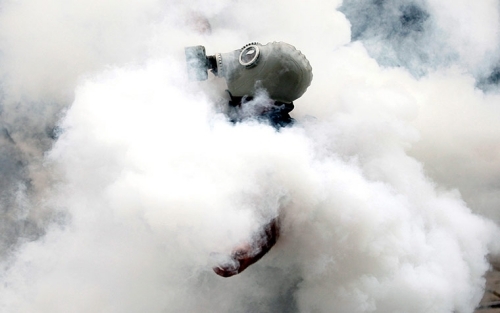Κείμενο που αναδημοσιεύθηκε στο roarmag από την μπροσούρα για την εξέγερση του Ιουνίου 2013 στην Τουρκία This is only the beginning
Κάποιες από τις επισημάνσεις του κειμένου έχουν ενδιαφέρον. Τις αναπαράγουμε εδώ (η έμφαση σε ορισμένα σημεία δική μας):
Looking at content and experience rather than quantity and votes gives us a clue for a way out of the democratic stranglehold. Mutual aid, solidarity and direct action, all of which have been the hallmarks of the Gezi Resistance, are in fact the antithesis to the democratic system run by elections and regulated by representatives. In fact, the Gezi Resistance was profoundly anti-democratic in the sense that it barricaded itself against the guardians of bourgeois democratic relations: the police. Those who have been evicted from Gezi Park attempted to recreate its spirit in popular assemblies that mushroomed around Istanbul and in other cities. The proliferation of these public forums has lead some to claim that it is an experience in direct democracy. Regardless of what one might call them, they are a refreshing form of political being for those who have lost hope in a democratic system. It is still unclear what shape these forums might take, but at their onset and during the largest participation they’ve had, they forego any sort of decision-making structure that would pretend to speak and act on behalf of the whole assembly. Apart from some exceptions, by and large the crowds did not seem to opt for a crippling consensus system neither for a majority vote negating the agency of minority opinions. Instead, proposals would be made from the stage and if there seemed to be enough interest, action would be taken. Sometimes this would be in the form of a spontaneous march and sometimes in the form of a working group.
[…]
A further lesson concerns the idealized revolutionary worker. Those who see the worker as the primary revolutionary agent must begin (as if they have not had sufficient reasons to do so already) to shift their gaze away from labor unions. Even the most leftist labor confederations in Turkey, such as DISK and KESK, were impotent in propelling the movement into the realm of the economy. Although this is not completely a fault of their own and also has to do with the historical decimation of organized labor by the state in Turkey, it was also clear that beyond the classical factory or industrial worker, the formally unorganized, precarious, white-collar and diploma holding proletariat on the brink of unemployment have the potential to take many initiatives in social revolts. Furthermore, the traditional blue collar proletariat might hold more revolutionary potential outside of their workplaces under the dominion of their unions. A crucial turning point for similar rebellions will come through the arrival of the antagonism from the squares and parks into the arena of commerce and work where this unorganized proletariat either already works, or is kept docile with its promise.

